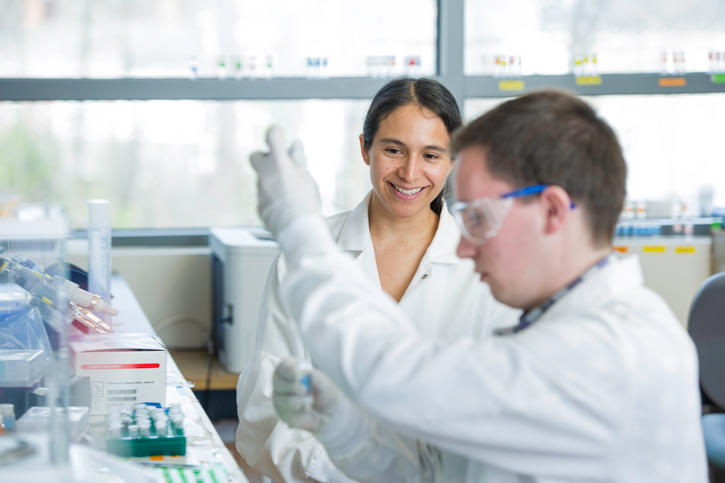Think Broadly, Look Closely
Concern, compassion, and hard science combine to create tools and systems that solve complex biological and medical problems in a wide-ranging field.
-
Advanced computer modeling, mapping, and sensor development improve the functionality of prosthetic limbs.
-
Robotics and cloud computing allow doctors to collaborate and perform delicate medical procedures and diagnostics from miles away.
-
Nanotechnology and signals processing improve the delivery of specifically targeted medical technology.
The CEC's Bioengineering Department partners dedicated Bioengineering faculty with leaders in Computer Science and Electrical and Computer Engineering in a collaborative program that also includes Mason's Biosciences faculty. The goal is to improve human health via research, innovation, and education.
See the university catalog for courses that students interested in Health Care Technology can take.
Educational Programs Related to Health Care Technologies
Develop new treatments for cancer patients using nanotechnology; help amputees regain mobility with sensor-equipped prostheses that respond to nerve impulses; or use computational math to understand population-based disease patterns. Our programs in bioengineering, electrical and computer engineering, computer science, and statistics and aim to find technical solutions to some of health care’s most pressing problems.
Bachelor's Degrees
Information Technology: Concentration in Health Information Technology, BS
The BS in applied information technology prepares students to apply IT to support business processes. The degree produces graduates with strong problem-solving, writing, and communication skills who successfully compete for technical employment and are prepared for advanced study.
Bioengineering, also referred to as biomedical engineering, is the application of engineering tools and approaches to solve problems in biology and medicine. It is a broad and growing field that draws upon rapid advances in technology and computation, as well as on unprecedented growth in basic biological understanding.
Master's Degrees
Bioengineering, MS
The Bioengineering graduate program prepares students for research and professional practice in bioengineering and related fields. The program includes both fundamentals and advanced work to apply engineering techniques to solve problems in biology and medicine.
For specicific degree information visit the University Catalog.
Biostatistics, MS
The MS in biostatistics allows students to specialize in the design and analysis of health-related and biological studies, while maintaining the rigor and technical training of the Statistical Science master’s program. The program, with its research core, will also be sufficiently rigorous for students who wish to pursue a Ph.D. in Biostatistics.
Doctoral Degrees
Bioengineering, PhD
The doctoral program in bioengineering is designed to prepare future leaders in bioengineering. Rapid advances in understanding the molecular bases of disease have opened up new opportunities to advance human health through research that integrates knowledge in modern biology, engineering, physics, and computer science. The doctoral program will prepare leaders in bioengineering in this broader, integrative sense of the discipline. A major distinguishing feature of the curriculum is that it is designed to educate leaders who understand and appreciate how biomedical technology is translated from the bench to the bedside.
Electrical and Computer Engineering, PhD
The PhD program in electrical and computer engineering educates students to do original research on ECE topics and become technical leaders in their fields. Students may choose research areas such as communications, networking, computer engineering, control and robotics, signal processing, micro/nano-electronics, and bioengineering. With a strong and growing department reputation for excellence, graduates have become professors at other universities and researchers in industrial and government research centers.
Statistical Science, PhD
The PhD in statistical science requires in-depth knowledge of modern statistical theory and practice. The degree program is a hybrid of mathematical theory, computation, and data analysis; and students are expected to be proficient in all three. Current research areas of key department faculty in the program include biometric identification, biostatistics, statistical genetics, statistical graphics, data confidentiality, networking analysis, and data exploration.

Assistant Professor Carolina Salvador Morales’s research in the Lab of Nano focuses on the uses and applications of a wide range of carriers at the nano and micron-size scale. Undergraduate Alex Nixon, had a job as a lab technician while he was a full-time bioengineering student.
Partnering with the Best
Our reputation for excellence and close proximity to the major research institutions in Washington helped us form the following partnerships:
-
National Institutes of Health Clinical Center
-
Walter Reed National Military Medical Center
-
U.S. Naval Research Laboratory
-
Children’s National Medical Center
-
Food and Drug Administration
-
Inova Health Systems
Such partnerships enable us to provide students with internship opportunities and the chance to network and make connections at the highest levels.
Thinking, Studying, Working Outside the Lab
When it comes to new health care solutions, our research only starts in the lab. Our students participate in programs that engage them with medical practices, both local and abroad, giving them first-hand experience with the challenges involved with improving wellness.
During the winter break, our students have the opportunity to travel to Guatemala to assist with repairing medical equipment in a remote hospital. They see first-hand the struggles faced by medical practitioners in less-than-ideal conditions, and they return to campus inspired to improve medical technology to be accurate, resilient, and sustainable
This sense of purpose and direction imbues the atmosphere at the College of Engineering and Computing as our community strives toward a healthier future.
